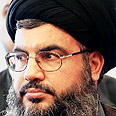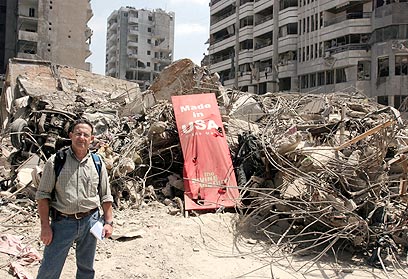
Nasrallah: Handing out aid
צילום: איי פי
Report: Beirut looks as though it has been through earthquake
Journalist Ron Ben-Yishai visits bombed out sections of Beirut, southern Lebanon: 'Sight of destroyed area socks you.' He tells about residents wandering through remnants of their houses shock-stricken, about Hizbullah operatives handing out money, and support of organization
LEBANON- "The airbus of the Jordanian airline came to a screeching halt immediately after landing. The surprised passengers lurched forward in their seats. When the plane about-faced, I saw the reason for the unorthodox maneuver: in the center of the runway, only a few meters away from where the plane stopped, a red bulldozer was busy pushing dirt and gravel into a huge gaping hole in the asphalt caused by an Israeli bomb." This is how Ron Ben-Yishai's visit to Lebanon starts.

Hizbullah outpost in ruins
The broad smile of the immigration officer turns into obvious anger when I ask him, "Are you Shiite?"
"What does it matter what I am," he raises his voice. "Shiite, Sunni, or Christian – We are all Lebanese who want to live. We love Lebanon. Hizbullah also loves Lebanon. I don't understand these Israelis, making such a big deal over two kidnapped? Go to the city and see what they did to us. Such destruction, such a disaster."
The destroyed area socks you. What was once a Hizbullah stronghold looks like a city after a hurricane, 9 on the Richter scale. Houses lie on top of one another, between then men, women and children wander about shock-stricken. They roam to and fro without any defined purpose.
Hizbullah operatives equipped with cranes try to lift slabs of concrete in order to find corpses under them. The defense headquarters of Hizbullah lies on its side. Imposing guards inside keep us from getting close to the building's remains. You can't even get close to what used to be the private residence of Nasrallah. You almost can't identify the building, which completely collapsed.
'I'm not a fighter, why did the Israelis destroy my life?'
Not far from there, Hizbullah set up an aid center for victims. Large signs guide the families whose houses were destroyed to clerks who file their complaints, mark the location of their house on a map, and determine the value of compensation. "They are giving me USD 12 thousand to rent an apartment," complains Khaidar, an affluent Shiite businessman whose house was destroyed. "It will take me a year to even buy new furniture. What will be after that? I'm not a fighter, so why did the Israelis ruin my life?""What do you think about Nasrallah?" I ask him. "He is a good man, a dear man. He needed to fight in order to save Lebanon from the Americans. They want to establish a new, Islam-free Middle East here so they told the Israelis to start a war," he responds.
Most Shiites believe in this conspiracy theory. Other ethnic groups don't dare outwardly place responsibility on Hizbullah. It is known that they are afraid of the organization and its members. Only in the most private, surreptitious of circumstances can condemning words be heard about Hizbullah, even by Shiites.
On the way to the airport, huge billboards are being covered. Pictures as big as buildings show Hizbullah operatives launching Katyushas with pictures of Israeli soldiers in coffins covered by Israeli flags next to them. Under each poster, in Arabic, French, and English are the words: Divine Victory.










